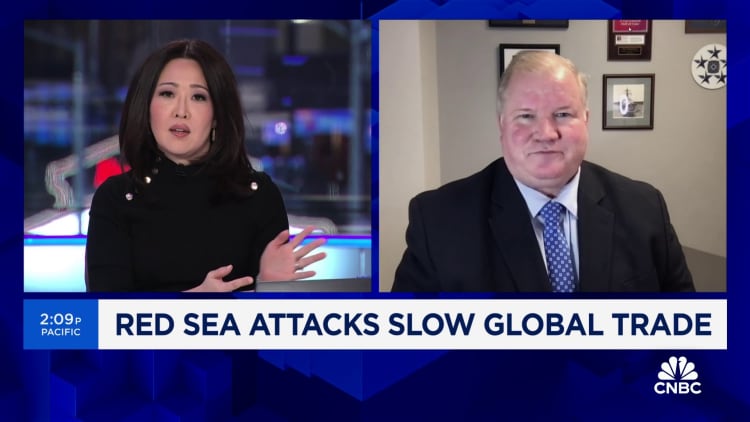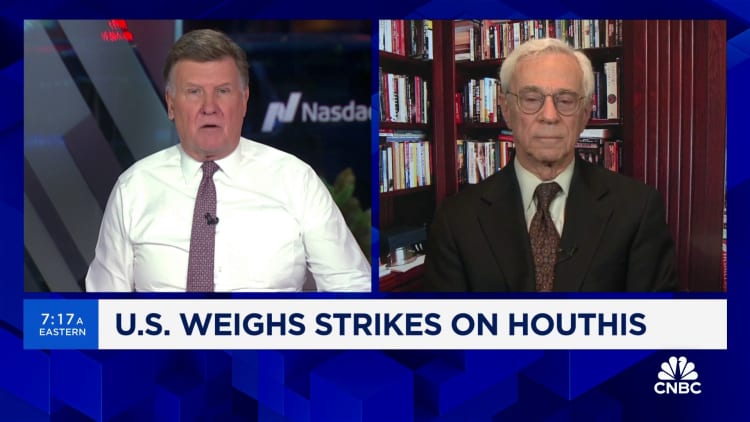The United States and the United Kingdom have "successfully conducted strikes" against Houthi targets in Yemen, President Joe Biden said late Thursday.
"Today, at my direction, U.S. military forces — together with the United Kingdom and with support from Australia, Bahrain, Canada, and the Netherlands — successfully conducted strikes against a number of targets in Yemen used by Houthi rebels to endanger freedom of navigation in one of the world's most vital waterways," Biden announced.
The Iran-backed Houthi militia group began their drone and missile attacks on shipping vessels and cargo ships traversing the Red Sea late last year, drawing global condemnation. The militants claim their attacks in the Red Sea are in response to the ongoing war in the Gaza Strip.
According to the U.S. Central Command, the U.S. Air Force struck more than 60 targets across 16 Houthi militant locations in those strikes, launching more than 100 precision-guided munitions.
The strikes — which targeted radar systems, air defense systems, and missile launch sites — began on Thursday at 2.30 a.m. local time in the Yemeni capital of Sanaa.
The strikes were "in response to continued illegal, dangerous, and destabilizing Houthi attacks against vessels, including commercial shipping, transiting the Red Sea," according to a joint statement from the governments of Australia, Bahrain, Canada, Denmark, Germany, Netherlands, New Zealand, Republic of Korea, United Kingdom, and the United States.
Together with Greece, Singapore and Sri Lanka, the nations make up the Operation Prosperity Guardian, a coalition that was launched in December to combat Houthi attacks.
But not all of them participated in the operation: The United States and Great Britain were the only two militaries that carried out the latest strikes. A senior administration official declined to comment on why the rest of the coalition members did not take part.

"These strikes have no association with and are separate from Operation Prosperity Guardian, a defensive coalition of over 20 countries operating in the Red Sea, Bab al-Mandeb Strait, and Gulf of Aden," CENTCOM said after the latest operation, in a post on X, formerly Twitter.
In response to the overnight strikes, the Houthis vowed that the U.S. and U.K. will have to pay a "heavy price."
In a post on X, senior Houthi official Hussein Al-Ezzi said: "Our country was subjected to a massive aggressive attack by American and British ships, submarines, and warplanes, and America and Britain will undoubtedly have to prepare to pay a heavy price and bear all the dire consequences of this blatant aggression."
According to a senior administration official, the Houthis launched about 20 drones and multiple missiles directly against U.S. ships in the Red Sea on Jan. 9. It was the largest attack yet on merchant vessels in the Red Sea and Pentagon officials told CNBC at that time that four coalition warships were deployed in response.
"This attack was defeated by the US and UK naval forces," the senior administration official said Thursday. "We have no doubt that ships would have been struck and perhaps even sunk, including, in one case, a commercial ship full of jet fuel."
At least three ships have been struck and there've been "extremely close calls," the official said.
"These reckless attacks have directly affected the citizens and cargo and commercial interests of more than 50 countries."
While the latest strikes on the Houthis were "significant" in size, the U.S. did not expect them to degrade Houthi capabilities entirely, said the senior administration official. "We would not be surprised to see some sort of response."

Israel has launched a large-scale bombing campaign in the Palestinian enclave after Hamas militants infiltrated the Jewish nation on Oct. 7, killing more than 1,200 people and abducting over 200 others.
More than 22,000 people in Gaza have been killed since the war began, according to UN data citing the Hamas-run Palestinian Health Ministry.
Global markets have been spooked by the escalating tensions that threaten to spread into the broader Middle East region.
Oil prices jumped on Friday in Asia amid continued fears of rising inflation and global shipping disruptions.
Since January, global shipping giants including Maersk, MSC, Hapag-Lloyd, and CMA CGM have paused their shipping activities in the Red Sea. Oil major BP has also announced it would "temporarily pause" all transits through the Red Sea.
"These targeted strikes are a clear message that the United States and our partners will not tolerate attacks on our personnel or allow hostile actors to imperil freedom of navigation in one of the world's most critical commercial routes," Biden said.
"I will not hesitate to direct further measures to protect our people and the free flow of international commerce as necessary."
— CNBC's Christina Wilkie contributed to this report.


